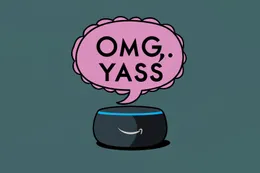
Dor TV (43-inch, QLED 4K) review
This subscription TV solves three of the biggest problems with watching and owning smart TVs, the biggest being managing your subscriptions into one.

This subscription TV solves three of the biggest problems with watching and owning smart TVs, the biggest being managing your subscriptions into one.

Level up your rizz game, y’all. Get yo self a sugar mommy who can buy you this hecka cool transparent TV that also liberates you from the hassle of wires, forever.

Amazon's not-so-smart smart assistant is finally moving out and getting ready to face the real world with generative AI capabilities. But it's new-found intuitiveness and ingenuity may cost you some bucks.

If you are a human with a streak of losing objects, but can’t quite absorb the financial hit of an Apple AirTag, the JioTag is a dirt-cheap object tracker that will rescue you for just Rs. 749.
A Carnegie Mellon University study reveals starting your brainstorming process with Google can be detrimental to the group's creativity.
Teams relying much on search engines often produced inundatingly same, less original ideas due to a cognitive bias called "fixation effect," where seeing popular answers converges our thought process instead of diverging it.

While individuals weren't necessarily dumber with Google, groups of Google users seemed to get stuck in a rut, often coming up with the same common ideas, sometimes even in the same order! Talk about a copy-and-paste creativity crisis.
"This appears to be due to the fact that Google users came up with the same common answers, often in the same order, as they relied on Google, while non-Google users came up with more distinct answers," explained lead author Danny Oppenheimer.
EDITORS' PICKS